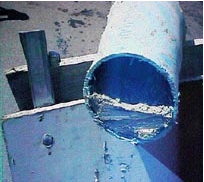
Oil and grease pollution prevention focuses on the elimination or reduction of waste before it is generated through changes in production, operation and raw material use.
Managing waste after it occurs may be costly and time consuming. Adopting pollution prevention is key to saving money, resources and to improving the quality of the environment. The Fort Worth water utility is committed to protecting the city’s wastewater system by encouraging and awarding those who take the extra step in preventing pollution.
Animal fats and vegetable oils, also known as grease for example, are some of the most common pollutants of the sewer system. Grease is the result of cooking and occurs naturally in many types of food. Grease enters the sanitary sewer as a result of food preparation and the washing of dishes, silverware, pots, pans and other equipment. Animal fats and vegetable oils go down the drain, where they cool and eventually solidify (fats and oils do not mix with water). Over time the sewer pipe’s diameter is significantly reduced by the accumulation of grease. Petroleum oils and byproducts from automotive repair facilities and car washes may also cause grease problems in the sewer system.
Residential, commercial and industrial facilities generate grease. Single-family homes, apartment complexes, restaurants, grocery stores, hospitals, airports, food processing plants, car washes and automotive service stations are just a few of the potential sources.
Grease Traps
Grease traps are designed to separate out the fats, oils, grease and solids from the wastewater discharged into the sanitary sewer system. Fort Worth requires restaurants, food processing facilities, automotive repair facilities, car washes, commercial laundries and all other facilities that the city deems necessary to install and maintain grease or grit traps. It is the responsibility of the generators to ensure that their grease/grit traps, and the wastewater discharged from them, are in compliance with all city requirements.
Restaurant Wastewater Discharge Permit Program
As a significant, potential source of grease within the city’s wastewater collection system, restaurants and other designated food service establishments are required to obtain a permit(PDF, 242KB) prior to discharging wastewater into the sanitary sewer.
Do’s and Don’ts
Most (but not all) sewer back-ups and blockages occur between the house or business and the city’s sewer main. The following suggestions will help to minimize all types of sanitary sewer blockages:
Do not:
- Pour grease, fats and oils from cooking down the drain.
- Use the toilet as a wastebasket.
- Use the sewer as a means to dispose of food scraps.
- Flush interceptor with hot water to clear or clean the interceptor in lieu of pumping out the device.
Do
- Scrape excess oil and grease into a container. Waste oil and grease from restaurants can be sold to rendering facilities. Residential sources should dispose of oil and grease in the garbage.
- Wipe dishes, pots and pans with a used paper towel prior to washing.
- Food scraps should be disposed in a compost pile or the trash. Avoid using the garbage disposal.
- Use screens and other equipment to ensure food material does not enter sink and floor drains.
- Facilities are required to have grease traps must have them pumped and cleaned at least once every 90 days, or more often as necessary to ensure proper function.
- Reduce, Recycle and Reuse.
Section 12.5-731 of the City Ordinance forbids the use of enzymes, bacteria and other forms of bioremediation without prior approval of the City of Fort Worth. These types of alternative treatments for FOG only work if conditions in the grease separation device are ideal. Otherwise, the FOG molecules are converted into shorter chain fatty acids, which may be flushed out of the grease separation device and into the sanitary sewer system. The fatty acids recombine into insoluble molecules, adhering to the surface of the sewer line and causing blockages in the collection system.
The use of bioremediation agents, without the prior approval of the City of Fort Worth, is considered a violation of the city ordinance and could subject violators to enforcement actions, including penalties of up to $2,000 per violation per day.